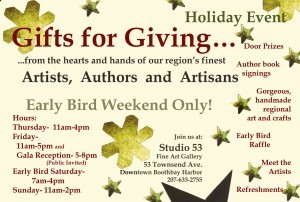Lea Wait's Blog, page 275
November 25, 2015
Thanksgiving Again!
Vaughn Hardacker here. Another year is almost gone and I’m staring my 68th Thanksgiving in the eye. I’ve never been a holiday type of guy (even less so now that my nuclear family has disintegrated) and for many years I’ve often wondered why people make such a big deal over them. My late wife loved them even though she worked herself into a state of exhaustion over them every year.
All that said. Since I lost Connie and most of my relatives have passed over to a better place or I have become isolated from them, I have started to look at the holidays differently. One factor that helps is I have many, many fewer people to provide for, the few who I am in touch with I have requested that they send no Christmas gifts and I will return the favor. What a stress reliever that is! It has taken the commercialism out of my holidays. I still don’t enjoy them, but at least I don’t get upset by ads in which every retailer in America tries to reach inside my wallet. I believe I lost Christmas spirit in 1973. I was a Marine stationed in Iwakuni, Japan. As Christmas came upon us all the Japanese stores were decorated with Santa Claus–now why would a Buddhist country that doesn’t observe Christian holidays do that? Simple, Japanese retailers don’t want to miss out on a good thing! Ask any one who works in retail what they think of the holidays–I worked in a big box store and we all hated and dreaded Black Friday (if you want to see a retailer invention look no further).
I remember my childhood. The Christmas season began on the day after Thanksgiving (not Labor Day as it does now), stores were closed on Sundays, and families spent those days together!
I now sit back and since I no longer have to run all over the place shopping for a bunch of stuff, which will in all probability be returned anyhow, have an environment that allows me to take time to reflect on the things I have to be thankful for:
This year’s list:
Publication of my second novel, THE FISHERMAN.
My third, THE BLACK ORCHID, under contract, edited, and sent to production for release on March 1, 2016.
My companion, Jane, who has kept this surly old curmudgeon in balance this past year.
I am, for the most part, healthy–at least healthier than most people my age.
The terrific authors who have kept me entertained and enlightened.
Readers! ‘Nuff said.
The community of writers who were instrumental in getting me to where I am as a writer.
Now that I’m retired, I can write whenever, wherever, and for whatever duration I want.
Finally, I’m thankful to be closing in on the completion of the first draft of a novel I started in 1989. (At the rate I’m going, first draft in twenty-six years it should be ready to send to a publisher in 2037!)
Finally: I hope you all have a great Thanksgiving and find a few quiet minutes to reflect on how lucky we Americans are to live where we do.
November 24, 2015
A Secret Past
Jessie: In Northern New England, thinking about the past.
Sometimes you think you know someone and it turns out that really you don’t. I’m not talking about politicians or dear friends or even a spouse with a secret. I mean characters. Especially those of my own making.
Last Saturday I was out shopping for Christmas gifts with a friend. Near the end of the day we wandered into a shop filled with vintage clothing for gentlemen and in amongst the waistcoats, suspenders and top hats I came upon a box filled with stereographic cards all dating from around 1900. I pounced up on them and began sifting through them one by one, admiring the old time photographs.
There were coastal views of Italy, temples in Egypt, elephants in India and my favorite, one labeled The Fishwives of Finland. As I looked them over I began to wonder not only about the people in the pictures but about the photographers who created the images. Who were these people? Were they avid photographers who just happened to live near popular tourist attractions and sent their work off to sell? Or were they taken by photographers traveling far from home?
As I stood in the dimly lit little shop an entire history for a character in my most recently completed novel unfolded in my mind. He’s a Gilded Age photographer who loves to snap candids of everyday people in Old Orchard. But looking at the cards in my hand I realized he had taken images much like the ones before me. We’d spent hundreds of words together, have known each other for over a year and I had no idea he had ever left the state of Maine.
I love it when this sort of thing happens. I’ve just begun working on a new book in the same series as the one I just completed and I’ve been thinking about ways to give this photographer a greater role. I’m still not sure what that will be. But I am certain at some point in his past he’s gone traipsing across Finland in search of fishwives to capture for posterity.
Readers, do characters in books often surprise you? Do you like it when they do? Writers, do your characters have secrets you are startled to discover?
November 22, 2015
The power of writing: A reminder from my distant past
Hi Crime Writer fans. Maureen here, in my chilly writer’s garret, with loyal dog and cat at my feet, waiting for the first snowflakes of winter to fall.

In the life of a writer, this is considered a big social gathering.
Writers lead fairly insular lives. That’s not a secret. In fact, it’s kind of a cliche. But true anyway. It’s just the nature of the beast. To write, we have to be alone with our heads and it can take a lot of time and effort.
I’m lucky enough to have a day job as a newspaper editor, which gets me out among people. Even so, that can be insular, too. We talk to people, we witness events and write about them. We call people up and expect them to reveal intimate details of their lives or thoughts so we can type it up and let thousands of others read them, too. But then we move on to the next story. The biggest story in the world still will end up in the recycling bin sooner or later. So it’s insular in its own way.
It has to be for us to do our jobs. In the last few weeks at the Morning Sentinel in Waterville, Maine, where I’m city editor, the five reporters at our paper have covered a quadruple murder-homicide and the fallout from it; the investigation, firing, further allegations and criminal charge against the Waterville High School principal, accused of propositioning a student on the first day of school; fatal car accidents, dozens of arrests for domestic violence and gross sexual assault — the list goes on. We do the stories the best we can — they consume us — but then we have to move on to the next one.

Newspapers, the biggest story in the world still finds it’s way to the dump sooner or later.
As a fiction writer, I pull from the deep recesses of my head and my heart, trying to form my truth and reality into something that will move others enough to understand that internal world.
In my other persona as a journalist, I take our responsibility seriously. I know what we do affects people, but I also know we’re writing about the world’s reality and our responsibility lies more in doing it well and right. It’s easy to believe it’s ephemeral.
That perception was shaken — more severely than I’d like to admit — the other day.
I was fiddling around with my iPhone, trying to delete a spam iMessage without actually opening it, when a file I never realized existed opened up: filtered messages. It included Facebook messages from as far back as 2011 that I’d never seen. Most of them were more spam or otherwise killable.
One stood out:
“Hi, I”m sorry to bother you. But I was wondering if you worked for a newspaper in 1983 and maybe wrote an article called ‘Jennifer, little lady with a big future.’ It was about a lil girl who’s a little person with her parents. If you did, I would like to thank you so much!!!”
In 1983 I was fresh out of college and working in the Sanford bureau of the Biddeford Journal-Tribune. I did remember the story — barely. If she hadn’t included the headline I’m not sure I would remember it at all.

Lots of water under the bridge since I wrote Jennifer’s story.
As a newspaper editor, I’m used to getting feedback. Much of it negative. When we’ve made a mistake or gotten something wrong, I’m embarrassed and regretful and angry with myself for letting it happen. When someone complains because we’ve done our jobs right, it doesn’t bother me at all. Then there’s the usual tirades from those who think we’re biased, we’re conspiring, we’re deliberately doing something they don’t like for our own nefarious ends. The insults when we turn off website comments on a story because of vulgarity, racism or other issues. I enjoy setting those people straight. Responding to that stuff is right in my wheelhouse.
Sometimes I just laugh. Like about five or six years ago when I was filling in as Sunday News sports editor at the New Hampshire newspaper I worked for at the time, and a high school student called on a busy Saturday afternoon wanting to interview a reporter — right then — for a school project. I clearly identified that I was the sports editor, explained that the sportswriters were all incredibly busy, gave him a couple email address of guys I thought might help him out, but not that day.
Two days later, his teacher emailed the sports editor to complain that “a secretary” (I’m not making that up) had not allowed the boy to talk to anyone in the sports department, and therefore the boy’s assignment couldn’t get done on time.
Readers, do you know me at all? Imagine my glee when the sports editor forwarded that email to me to answer.
Once in a while, in my ten years as a reporter and now as an editor and a columnist, I’ll get a heartfelt thanks from someone the day something appears, or a couple days after.
But that’s pretty much the feedback I deal with as a newspaper editor, and that’s fine with me. Our work is fast, it’s deadline-driven, it’s not always pretty, and there’s always another story right behind it — or a couple dozen — to take its place.
The story about Jennifer wasn’t some major blockbuster. It wasn’t even important enough to me, for instance, to include in an envelope of Journal-Tribune clippings I came across recently that I’d used to apply for reporting jobs in 1984. If it weren’t for the headline, I don’t know if I’d remember it at all.
But it touched Jennifer enough that she found me decades later on the Internet just so she could thank me.
I may not have remembered the story in the 30-plus years since I’d written it, but I’m pretty sure I’m going to remember that.
Maureen Milliken is the author of Cold Hard News, the first in the Bernie O’Dea mystery series. Follow her on twitter at @mmilliken47, on Facebook at Maureen Milliken mysteries and contact her through her website, maureenmilliken.com.
November 20, 2015
Weekend Update: November 21-22, 2015
 Next week at Maine Crime Writers there will be posts by Maureen Milliken (Monday), Jessie Crockett (Tuesday), Vaughn Hardacker (Wednesday), and Kaitlyn Dunnett/Kathy Lynn Emerson (Friday). Thursday, of course, is Thanksgiving, when we’ll have a “Ghost post” from the late country living writer, A. Carman Clark, about stuffing and what to do with that turkey carcass.
Next week at Maine Crime Writers there will be posts by Maureen Milliken (Monday), Jessie Crockett (Tuesday), Vaughn Hardacker (Wednesday), and Kaitlyn Dunnett/Kathy Lynn Emerson (Friday). Thursday, of course, is Thanksgiving, when we’ll have a “Ghost post” from the late country living writer, A. Carman Clark, about stuffing and what to do with that turkey carcass.
In the news department, here’s what’s happening with some of us who blog regularly at Maine Crime Writers:
Lea Wait: This weekend, Saturday from 7 a.m. (early bird sale!) until 4 pm, and Sunday from 11 a.m. until 4 p.m., my books and I will be joining other authors, craftsmen and artists at the Gifts for Giving holiday event at Studio 53, 53 Townsend Avenue in Boothbay Harbor, Maine.
And make sure Thursday, December 3, is on your schedule if you live near Newton Highlands, Massachusetts … that’s Mystery Night at the New England Mobile Book Fair, and many of the Maine Crime Writers (plus mystery authors from all over New England) will be there from 6-8 pm celebrating the holidays – and mysteries! More details next week.
And Kate Flora says, since we’re about ALL THINGS MAINE, pick up a copy of the Kenneth Roberts cookbook, Good Maine Food, (as I just did since someone at a party suggested it) and read a bit. Great excerpts from the book and recipes to cook raccoon and woodchuck and those delicious porcupine livers, in case you’ve been wondering what to do with wildlife besides watch it.
And — a HAPPY THANKSGIVING from our families to yours!
An invitation to readers of this blog: Do you have news relating to Maine, Crime, or Writing? We’d love to hear from you. Just comment below to share.
And a reminder: If your library, school, or organization is looking for a speaker, we are often available to talk about the writing process, research, where we get our ideas, and other mysteries of the business. Contact Kate Flora: mailto: kateflora@gmail.com
Rehabbing the Geek Room
John Clark sharing the changes to my favorite room here at the house. First a bit of background. We lived in our first home for 27 years, doing one heck of a lot of renovation as well as building a new addition that had a real cellar, a big living room with an entire wall of book cases and a computer room Beth and I shared above the living room. This was the first time I’d ever had a room more or less dedicated to my growing love of technology. One of my fondest memories early on when the room wasn’t completely finished was playing the Elder Scrolls Arena on my first PC and listening to the game through headphones. I was clearing a dungeon when I was ambushed from behind by a giant spider. The roar as it attacked was so unexpected and scary that my butt cleared the chair by a good six inches. Beth was working on her PhD and I was busy writing the first three books in the Wizard of Simonton Pond series while we lived there.

The old graphics don’t do justice to what was one heck of a game
When we were looking for a house in 2003, among the things we were certain we wanted were rooms for each of us to call our own. Beth claimed the front room overlooking the street as her sewing room, I chose the octagonal one that looked west over the old town swimming pool (long since filled in). I filled all the book cases, put framed art and odd license plates on the walls won a rug to go on the floor and set up my toys. I’ve built all my own computers except for laptops since 1995 and accumulate extra video cards, hard drives RAM, etc. as time goes on. Add in all the documents that tax returns require, printed manuscripts, a replica of Gandolf’s sword and staff, more aromatherapy candles than one needs in three lifetimes, plus another massive infusion of stuff when we cleaned out Mom’s house and you begin to understand how space began to disappear in the Geek Room.
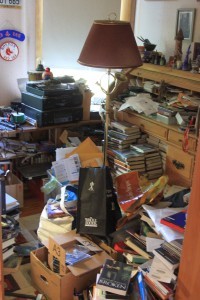
How I avoided killing myself in here is a mystery
Somewhere in there, I started accumulating books, particularly young adult fiction I planned to read. In hindsight, I was rather delusional about my ability to read as many as I accumulated, but that didn’t slow the insanity. Nope, not one whit. When we added a cat who we later discovered had an almost untreatable case of irritable bowel syndrome and said cat liked to spend most of its time in the Geek Room, things were elevated to a new level of odiousness. One would think that a relatively intelligent person might back away from the room/situation and wonder whether things were out of control. Unfortunately, that wasn’t me, not for a few years, at least.
A month ago we realized that daughter Sara, husband Russ and granddaughter Piper would be in Florida for two weeks this November, Beth and I agreed it was time to renovate the room. Fortunately, neither of us suffered from the delusion that it would be easy, fast or be completed before she had to go back to taking care of Piper. It hasn’t easy (although easier than either of us expected), it wasn’t fast, nor is it complete as of this writing, but it has been an extremely interesting journey. Here’s how it shook out.

Temporary clutter in Beth’s sewing room
We started by getting enough boxes to hold the accumulation so we could move stuff away from the walls. After they were filled in somewhat logical order, many went out to the storage building, while the rest went into Beth’s sewing room. In the process, I triaged a ton of old paper (three trash bags went to the transfer station of recyclable paper alone). I decided to get rid of most computer game boxes, keeping manuals and discs to save shelf space. My CD tower was another casualty since I’d ripped everything to MP3 format and given away the discs. Two rounds of the ‘do I keep or donate it’ game resulted in the TBR pile shrinking by 50%. Once the majority of mess (sounds like a great name for a band) was corralled, we moved stuff away from the wall and while I continued sorting, Beth went at the old wallpaper. One of her friends suggested adding fabric softener to the water to hasten the process and it worked really well. Most walls had one layer, but the one above a window seat with storage beneath it had three different kinds, making the process slow for a bit.

Paint equivalent of light at the end of the tunnel.
Once the walls dried, it was sand and slap mud time. Beth’s brother Paul, up from Massachusetts for a brief visit, stepped in and helped with this part of the rehabilitation. Then it was on to more sanding and a coat of primer. Beth did the brush work around molding and the ceiling while I was Rollerman. The next day we put on the first coat of sea blue paint, waited 4 hours and applied the second one. Even after that, we could see a ton of tiny places where unevenness in the old plaster fooled both brush and roller, so we went after them with smaller brushes. The result, as you can see in the pictures, came out pretty well. After assembling the new computer desk and buying a rug that matches the walls nicely, it was time to start putting stuff back. My goal was to keep neatness as the number one objective. This meant looking at everything returning from boxes with fresh, jut slightly jaundiced eyes. This resulted in more boxes destined for the Salvation Army, my RCA stereo and multi CD changer going to my library protege Briana, plus several boxes of things I can sell. Cash takes up very little space in comparison to collectibles.
In the process of sorting things, I discovered a number of treasures both monetary and sentimental. For example, I recently got in touch with my cousin Janice in California who I gave away at her wedding the year I started college because her father was dead as was her older brother Eddie who was killed in Vietnam. When Mom died, I found a number of pictures I thought she’d like, but never got around to sending them. After we chatted on the phone and I sent off that batch, I looked through the albums which had been stored under the window seat. I not only found more photos including her mother’s graduation picture, but one of her parent’s wedding in my grandmother’s garden plus several newspaper articles about her father when he was a photographer in Redondo Beach. All of those head off to her today.

Almost done
Other treasures include photos of at least four generations on my father’s side with many identified, two copies of the family tree Mom worked on for years, a class photo from New Portland with every kid identified (it was my grandfather’s class, so it is at least 120 years old), my father’s baptismal certificate, his high school yearbook and coolest of all, my great grandfather Clark’s class day program from Bowdoin College in 1884 that looks like it was printed last week. There are tons of stamps and a bunch of letters, two of which were written by relatives in 1811. I also have close to a thousand old postcards, many of which have Maine and family scenes. Heck, I even found my own high school yearbook from 1966.

Geek approved and ready to blog/write/game play.
The room is pretty much back together, save for the pictures as well as the sword that need to be hung. I’ve already noticed a distinct difference in the acoustics as well as a much greater level of comfort at the new desk. It was a long overdue project, but probably done at exactly the right moment. If you’ve been dragging your heels on a similar one, take heart from our experience.
November 18, 2015
KILLER THANKSGIVING RECIPES – Part Two
Susan Vaughan here. I posted two killer Thanksgiving recipes last year, and this year I’m reprising the cranberry sauce one and adding a new one.
Thanksgiving is my husband’s favorite holiday—family and friends, great food, but no pressure about gifts—so we have the complete Thanksgiving turkey dinner, no matter it’s just the two of us. Back in the Dark Ages when I grew up, the only cranberry sauce I knew was a tasteless jelly that came in a can (sorry, Ocean Spray). One spoonful and I decided this side to the turkey extravaganza was not for me. As an adult, I shunned even homemade sauce, thinking it would be no better. It wasn’t until I married that I learned to love the real thing. At my in-laws’ home for our first Thanksgiving as a married couple, of course I couldn’t turn down my mother-in-law’s homemade whole-berry cranberry sauce.
Yeah, it’s a cliché in novels when an author describes taste as exploding on the tongue, but that was exactly my experience. At last, a cranberry sauce that made my taste buds dance. Every Thanksgiving since, I’ve made her killer recipe and am sharing it with you in her memory. The recipe can be adjusted for different amounts of berries.
WHOLE-BERRY CRANBERRY SAUCE
Ingredients: 12 ounces fresh cranberries, 1 ½ cups of water, 1 ½ cups of sugar. Combine all in a saucepan and heat on stove top.
Stir until sugar is dissolved. Bring to a boil and boil about 20 minutes. Let cool slightly, then pour into a bowl or mold. Chill. The sauce jells nicely and looks pretty, almost too pretty to eat.
Next up is a Maine version of the sweet-potato/yam casserole my mother used to bake.
PUREED YAMS Ingredients for 6 servings: 3 yams or sweet potatoes, cooked, then peeled and cut into 3-inch pieces, 4 tablespoons butter, cut up, 1 tsp nutmeg, ½ tsp cinnamon, Salt and pepper to taste, ½ cup maple syrup (or to taste). I think this recipe would be good with winter squash as well.
Sprinkle cooked and cut-up yams with spices, maple syrup and butter. Mash by hand or lightly in food processor until pureed, but take care not to overwork them. Bake in 9 X 11″ dish at 375 for 15-20 minutes to heat.
And if you make it the way my mother did and the way my husband likes, top with tiny marshmallows and broil until they melt and/or brown.
Anyone who would like printable versions of these recipes, email me at shvaughan.author@gmail.com. Put “Thanksgiving recipes” in the Subject line. And Happy Thanksgiving to all!
*** My latest release is ALWAYS A SUSPECT, the prequel to my Task Force Eagle series. You can find more information about my books at www.susanvaughan.com.
November 17, 2015
Best New England Crime Stories 2016: Red Dawn–The Maine Connections
 Hi All. Barb here. Every year I write a blog post about the Maine writers whose stories appear in the lastest release in the Best New England Crime Stories series from Level Best Books. Sadly, this will be my last year to do so. My era as a co-editor of this delightful series has ended. Happily, this is not the end of the anthology. A new group of editors has stepped in. They expect to open submissions, as usual, in January.
Hi All. Barb here. Every year I write a blog post about the Maine writers whose stories appear in the lastest release in the Best New England Crime Stories series from Level Best Books. Sadly, this will be my last year to do so. My era as a co-editor of this delightful series has ended. Happily, this is not the end of the anthology. A new group of editors has stepped in. They expect to open submissions, as usual, in January.
Maine authors are always over-represented in Level Best submissions. Partially, I think this is because Level Best has had a Maine connection going back to one of the founding editors, Kate Flora. Another reason is that Maine has great organizations like the Maine Writers and Publishers Alliance to get the word out about submissions. But mostly, I think it is because much of the best crime writing in New England is happening in Maine. This year we have an unusual bumper crop of nine Maine authors, whose stories range from classic mysteries to woo-woo to noir and everything in between.
You can purchase Best New England Crime Stories 2016: Red Dawn in paperback or Kindle formats from Amazon here, for Nook here, and in paperback directly from Level Best here.
This year’s authors, as always, include familiar faces and new.
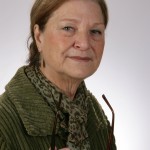 We all know Dorothy Cannell, who is a true force of nature. Despite her long and glorious publishing history, her story, “Singed” represents her Level Best debut. Dorothy is one of those rare people who can somehow squeeze a classic whodunnit into 5000 words. Born in Nottingham, England, Dorothy came to the U.S. in 1963. She married Julian Cannell, and lived in Peoria, Illinois, from 1965 to 2004. They now reside on the Maine coast with their dog Teddy and a cat named Killer.
We all know Dorothy Cannell, who is a true force of nature. Despite her long and glorious publishing history, her story, “Singed” represents her Level Best debut. Dorothy is one of those rare people who can somehow squeeze a classic whodunnit into 5000 words. Born in Nottingham, England, Dorothy came to the U.S. in 1963. She married Julian Cannell, and lived in Peoria, Illinois, from 1965 to 2004. They now reside on the Maine coast with their dog Teddy and a cat named Killer.
 Bruce Robert Coffin makes his fiction debut in Red Dawn with his story, “Foolproof,” which gives new meaning to the expression, “the bottom of the barrel.” An award-winning artist and retired police detective sergeant, Bruce Robert Coffin has penned a number of short stories along with his first novel, The Reaping. He resides in Maine with his wife.
Bruce Robert Coffin makes his fiction debut in Red Dawn with his story, “Foolproof,” which gives new meaning to the expression, “the bottom of the barrel.” An award-winning artist and retired police detective sergeant, Bruce Robert Coffin has penned a number of short stories along with his first novel, The Reaping. He resides in Maine with his wife.
 Another Maine debut author is Sanford Emerson, whose story, “Devious Doings in Dallas,” impressed the editors with its strong voice and point of view. After retiring from a thirty-five year career in law enforcement and corrections in Franklin County, Maine, Sandy operates a Christmas tree farm and a woodworking business in Wilton, Maine. If this sounds a little familiar–it should. Sandy is the husband of Maine Crime Writer, Kathy Lynn Emerson.
Another Maine debut author is Sanford Emerson, whose story, “Devious Doings in Dallas,” impressed the editors with its strong voice and point of view. After retiring from a thirty-five year career in law enforcement and corrections in Franklin County, Maine, Sandy operates a Christmas tree farm and a woodworking business in Wilton, Maine. If this sounds a little familiar–it should. Sandy is the husband of Maine Crime Writer, Kathy Lynn Emerson.
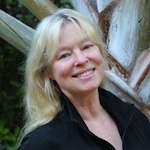 Another familiar name is Kate Flora, whose story, “Nice Guy,” shows us why they always finish last. Kate is the author of fourteen books. Death Dealer was an Agatha and Anthony nominee. And Grant You Peace won the 2015 Maine Literary Award. She’s a former assistant attorney general, a founder of Level Best Books, and was international president of Sisters in Crime.
Another familiar name is Kate Flora, whose story, “Nice Guy,” shows us why they always finish last. Kate is the author of fourteen books. Death Dealer was an Agatha and Anthony nominee. And Grant You Peace won the 2015 Maine Literary Award. She’s a former assistant attorney general, a founder of Level Best Books, and was international president of Sisters in Crime.
 Judith Green continues her streak as the only author to be published in every anthology by Level Best–lucky thirteen this year. Her story, “Dear Manuel,” continues her chronicle of the life of Margery Easton with a modern take on an epistolary story. As a former Adult Education Director for an eleven-town school district in rural western Maine, Judy has written twenty-five high-interest/low-level books for adult students. Her mystery stories have been chosen for each of the anthologies of New England Crime published by Level Best Books. “A Good, Safe Place,” published in 2010 in Thin Ice, was nominated for an Edgar®.
Judith Green continues her streak as the only author to be published in every anthology by Level Best–lucky thirteen this year. Her story, “Dear Manuel,” continues her chronicle of the life of Margery Easton with a modern take on an epistolary story. As a former Adult Education Director for an eleven-town school district in rural western Maine, Judy has written twenty-five high-interest/low-level books for adult students. Her mystery stories have been chosen for each of the anthologies of New England Crime published by Level Best Books. “A Good, Safe Place,” published in 2010 in Thin Ice, was nominated for an Edgar®.
 In Gin Mackey‘s story, “The Demise of My Wives,” an author finds a cure for writer’s block that’s both grisly and surprising. Gin spent years writing for Fortune 500 corporations before finding her passion: writing fiction. Her short story “Swimming Lessons” appeared in the anthology Fish or Cut Bait. Gin lives on the coast of Maine, where she’s hard at work on her novel Disappear Our Dead, featuring Abby Tiernan, a grieving widow turned home funeral guide.
In Gin Mackey‘s story, “The Demise of My Wives,” an author finds a cure for writer’s block that’s both grisly and surprising. Gin spent years writing for Fortune 500 corporations before finding her passion: writing fiction. Her short story “Swimming Lessons” appeared in the anthology Fish or Cut Bait. Gin lives on the coast of Maine, where she’s hard at work on her novel Disappear Our Dead, featuring Abby Tiernan, a grieving widow turned home funeral guide.
 Dale T. Phillips serves up a classic “Lady or the Tiger,” story with “Hope It Fits,” in Red Dawn. Dale is the author of four novels, over 50 short stories, story collections, poetry, and a non-fiction career book. He’s appeared on stage, television, and in an independent feature film, Throg. He co-wrote and acted in a short political satire film. He competed on Jeopardy and Think Twice, and lost in spectacular fashion on both.
Dale T. Phillips serves up a classic “Lady or the Tiger,” story with “Hope It Fits,” in Red Dawn. Dale is the author of four novels, over 50 short stories, story collections, poetry, and a non-fiction career book. He’s appeared on stage, television, and in an independent feature film, Throg. He co-wrote and acted in a short political satire film. He competed on Jeopardy and Think Twice, and lost in spectacular fashion on both.
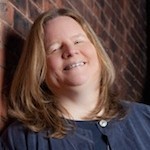 Barbara Ross (yes, that’s me!) also serves up an epistolary story with “The Perfect Woman.” This one takes place in 1947-48 and took me back to my maternal grandmother’s family summers in the Jersey Highlands. I am the author of the Maine Clambake Mysteries, Clammed Up, Boiled Over and Musseled Out. Fogged Inn will be published in February, 2016. My husband and I own the former Seafarer Inn at the head of the harbor in Boothbay Harbor, Maine.
Barbara Ross (yes, that’s me!) also serves up an epistolary story with “The Perfect Woman.” This one takes place in 1947-48 and took me back to my maternal grandmother’s family summers in the Jersey Highlands. I am the author of the Maine Clambake Mysteries, Clammed Up, Boiled Over and Musseled Out. Fogged Inn will be published in February, 2016. My husband and I own the former Seafarer Inn at the head of the harbor in Boothbay Harbor, Maine.
 Level Best’s third Maine debut author is Annelisa Johnson Wagner, whose story is “No Aura.” Annelisa grew up in northern New Hampshire but now lives in southern Maine. She misses the White Mountains but appreciates the rocky coast. She is a middle school teacher and a member of Writers on Words, a writing group. This is her first fiction publication but she has also completed a novel and continues to hone her writing.
Level Best’s third Maine debut author is Annelisa Johnson Wagner, whose story is “No Aura.” Annelisa grew up in northern New Hampshire but now lives in southern Maine. She misses the White Mountains but appreciates the rocky coast. She is a middle school teacher and a member of Writers on Words, a writing group. This is her first fiction publication but she has also completed a novel and continues to hone her writing.
Maine writers, we hope you’ll continue submitting to Level Best. And readers, we hope you continue to enjoy the stories!
Where Are The Perks?
by Dorothy Cannell
I am feeling embittered. My life as a published author has little similarity to the glamorous, pampered existence I once believed would be assured me in return for the gift of my every printed word.
Where is the devotedly efficient housekeeper? As I write this the dust thickens on furniture and in corners and will continue doing so until I hear my husband stomping around muttering that when it comes to cleaning a man’s work is never done. Where are the secretaries? The clerical one who would proof read this blog when finished, correcting punctuation and deleting as she (or he) deems required. The social one who would this afternoon take our two cats to the vet for their check ups. Then go and have my hair cut for me. Where is the French chef ready whip up elegantly delicious meals, snacks, drinks at a moment’s notice? Instead, previously mentioned husband (name escapes me) is putting a hot dog and baked bean casserole in the not preheated oven.
This mood will pass. I will see the negatives of having a home cluttered with staff. I’d have to talk to them for one thing – time consuming. I’d have to accept despising looks – if my hair wasn’t well combed or I slobbed around in my dressing gown all day.
There is a positive side to this pettishness regarding reality. It springs from having reached a point in current book Peril in the Parish where I want to burrow in and not come out until my characters pause in telling me what comes next. Against this there is the tug of the real world, because though less exciting than the fictional one (Scotland Yard has never requested my help in solving a particularly difficult case) it provides the base for who I am as a person and a writer.
I am now going to try and sort out what our two cats are arguing about – hopefully not politics or religion. Tell Teddy (dog) that his father and I very much appreciate the fact he has never taken the car out and wrecked it or asked to attend an Ivy League college.
And finally, assure husband that no French chef could concoct a more exquisite hot dog and baked bean casserole.
November 15, 2015
Improvising – My Life and My Writing
Lea Wait here.
Last weekend I attended Crime Bake, the New England mystery conference in Massachusetts, and to my delight Hallie Ephron mentioned on a panel that acting was an important skill for writers.
I felt like standing up and cheering. You see, when I was an undergraduate, I knew I wanted to write, but I hadn’t focused yet on what I wanted to write. During high school summer vacations I’d worked in a Maine playhouse, and I’d written plays, poetry and a little fiction.
So I majored in both English and drama, focusing, when I could, on playwriting.
But in a small liberal arts college (Chatham College — now University — in Pittsburgh, Pennsylvania,) drama majors were required not only to study drama, but theater. I took directing classes, painted scenery, and took part in every school production, large or small. I also studied acting at both Chatham and at the Pittsburgh Playhouse School of the Theater.
But it was a class on the philosophy and history of dramatic criticism, an upper-class course I took my freshman year, that changed the way I saw my life. The professor in that course demanded not only that we read Aristotle and Plato (and so forth) but that we demonstrate that we’d understood their dramatic theories by acting them out.
He believed (combining several well-known schools of acting), that every character must have a motivation in every scene. A need. That motivation influences how he or she plays the scene.
I will never forget the first class, in October of my freshman year, when I was asked to stand up and act “to overcome.” I had no idea what I was supposed to do. After the professor repeated his instruction (multi times, with frustration,) finally an upper classman stood up, came over to me, and said, “Do you know how to do what he’s asking?” By that time in tears, I shook my head. “Then go over and tell him that, to his face,” she said. I did. The class applauded … they’d understood all along (they’d studied with this professor before) that by doing that I had “overcome” my fear.
After that, I caught on. I acted when I was supposed to. About six months later the same professor took me aside and pointed out something I’d never realized: that I “acted in” rather than “acting out.” If I was to act “fear,” for example, I cowered. I never ran or screamed, as some of the other students did. After that I experimented with acting inward or outward — learning more about myself than about acting.
And by the next year I was not only doing improvisational theater in school and, for fun, with fellow acting students outside of class, but I taught a class in improv for kindergarten students.
After graduation I moved to New York and took professional classes in improvisational theater. (Gene Hackman was a classmate, and I met my first husband, a television comedy writer, there.)
After that I moved on to other, more academic and corporate interests. But I often found myself sitting in long meetings consciously playing the role of “bright executive” or “serious student” or “to survive.” I had the courage to produce and be on-camera talent in a daily corporate CCTV show for two years. I got through a lot of difficult moments in my life by pretending to be someone stronger, wiser, or tougher than I felt.
Now I write fiction. My heroes and heroines also play roles — the ones I assign them — and have motivations. Sometimes they act “in” and sometimes they “act out”.
Without learning improvisational acting, my life — and my writing – wouldn’t be the same. I strongly recommend improv to anyone, at any age, looking to understand themselves — or their characters — better.
At least – it worked for me.
Lea Wait writes the 7-book Shadows Antique Print Mystery Series and the 2-book Mainely Needlepoint series, the third of which, THREAD AND GONE, will be published in December. She also writes historical novels for readers eight and up, and a memoir with writing advice, LIVING AND WRITING ON THE COAST OF MAINE.
November 13, 2015
Weekend Update: November 14-15, 2015
 Next week at Maine Crime Writers there will be posts by Lea Wait (Monday), Dorothy Cannell (Tuesday), Barb Ross (Wednesday), Susan Vaughan (Thursday) and John Clark (Friday).
Next week at Maine Crime Writers there will be posts by Lea Wait (Monday), Dorothy Cannell (Tuesday), Barb Ross (Wednesday), Susan Vaughan (Thursday) and John Clark (Friday).
In the news department, here’s what’s happening with some of us who blog regularly at Maine Crime Writers:
Chris Holm received exciting news this week. The Strand Magazine published its list of ten best mystery novels of 2015 and Chris’s The Killing Kind is #1. Way to go, Chris!
from Kathy Lynn Emerson/Kaitlyn Dunnett: Last weekend was the New England Crime Bake, including the launch of the new Level Best anthology, Red Dawn, which included stories by several of our regular bloggers plus one husband (mine). Here are a few photos.
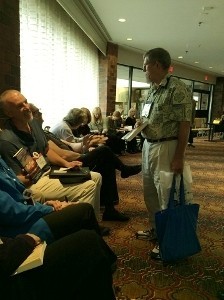
Bruce Coffin signing a book for John Clark. Dorothy Cannell and Kate Flora are at the far end of the signing line.
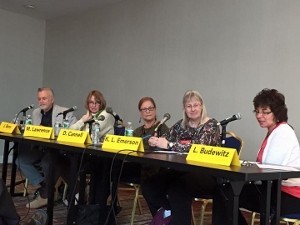
Panel on historical mysteries with James R. Benn, Mary Lawrence, Dorothy Cannell, Kathy Lynn Emerson and moderator Leslie Budewitz,
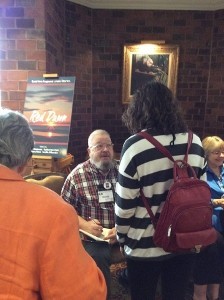
Kathy’s husband, Sandy Emerson, at his first signing for a story in RED DAWN.
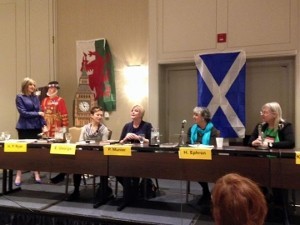
Panel with authors of how-to books moderated by Hank Philippi Ryan. Shown are Elizabeth George, Paula Munier, Hallie Ephron and Kathy Lynn Emerson.
from Lea Wait: Today (Saturday, November 14,) I’ll be speaking about an author’s life and my LIVING AND WRITING ON THE COAST OF MAINE at Maine Coast Books, Maine Street in Damariscotta, Maine, at 11:00.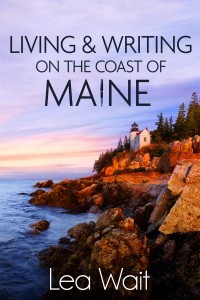
Then at the end of the week my books and I’ll be at Studio 53 (53 Townsend Avenue, Boothbay Harbor, Maine) along with wonderful local artists, writers and craftspeople for their annual Gifts for Giving show. The show will be open Thursday, November 19, from 11 am until 4 pm; Friday, November 20, from 11 am until 8 pm (including a Gala Reception from 5-8;) Saturday (early bird shopping in Boothbay Harbor) from 7 am until 4 pm; and Sunday the 22nd from 11 until 4.
An invitation to readers of this blog: Do you have news relating to Maine, Crime, or Writing? We’d love to hear from you. Just comment below to share.
And a reminder: If your library, school, or organization is looking for a speaker, we are often available to talk about the writing process, research, where we get our ideas, and other mysteries of the business. Contact Kate Flora: mailto: kateflora@gmail.com
Lea Wait's Blog
- Lea Wait's profile
- 509 followers


